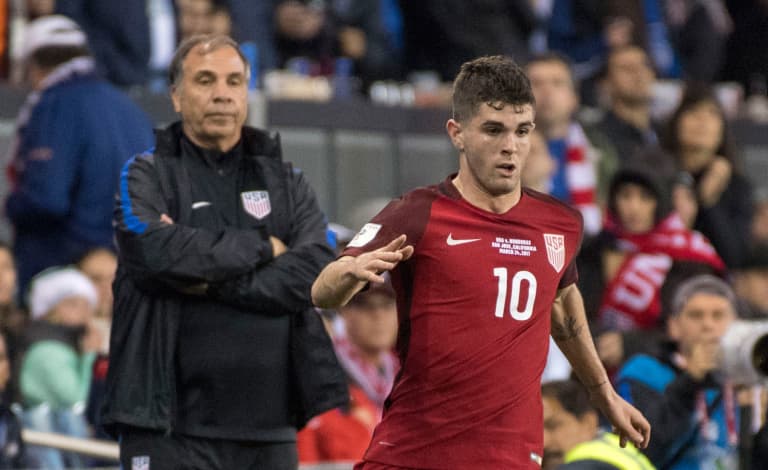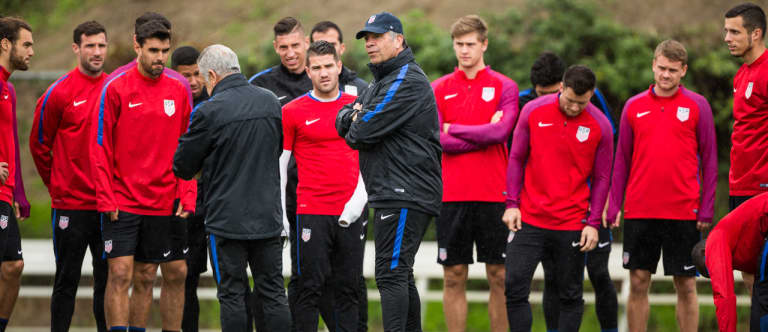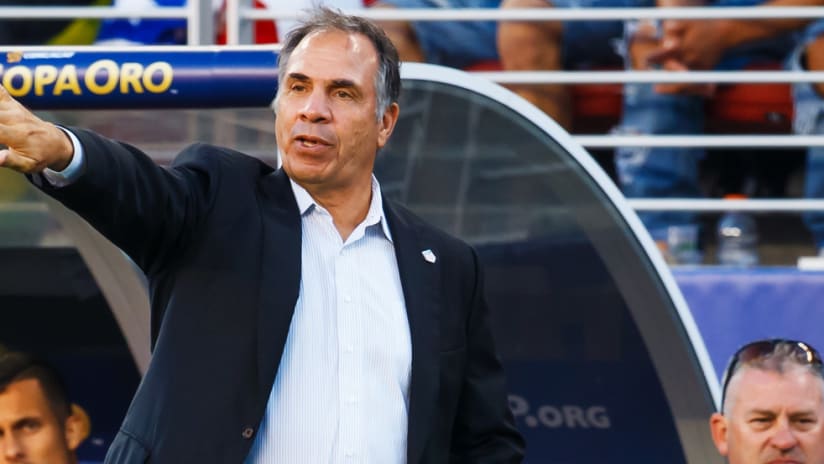Whether it's fair or not, it comes with the territory for professional soccer head coaches: Lead your club to wins and titles and you're considered a genius. Lose and the second-guessing will mercilessly poke holes at your competence.
But US national team head coach Bruce Arena wants you to know that he thinks we make too much of the coach's role: "The players are playing the game," he told a panel of journalists in Honduras during a wide-ranging interview that followed the home loss to Costa Rica in early September.
“I think too often coaches get too much credit and too much blame," he said. "The game is really the players are playing the game… Of all games, a soccer game is decided by the coach?”
“I think too often coaches get too much credit and too much blame," he said. "The game is really the players are playing the game. You’re preparing them to play, but I think it goes way too far. I giggle most of the time, to be honest with you. I know coaches, and we always laugh about it when the game is decided by the coach. Of all games, a soccer game is decided by the coach?”
"Once the game starts [in soccer], the coaching factor is a lot different in our sport than basketball or football. [Coaches] have less control [once the game starts] than you do in the preparation of the team and setting a tone. Coaching is a factor, believe me, but when the game starts the players are much more influential than the coaches.”
I accept that Arena has seen more things in soccer than I’ve experienced in my entire life, but I take the opposite point on the issue.
Soccer is a coach's game
I’ve heard it time and time again over the years – soccer is a players’ game – and it’s always irked me. It’s wrong. I’m not entirely positive I’m not just being a whiny ex-player, but I’ve seen so many teams succeed and fail based on the coach.
Soccer is a coach’s game; players are cogs in the machine that the coach builds.
I understand the premises of Arena’s point: Soccer is a fluid game, and with limited substitutions and no timeouts, there is very little a coach can do once the whistle blows; a coach can't score a goal or made a sliding tackle. But anyone who’s ever been any good at anything understands the actual act of doing the thing is only a small part of the total process.
For every minute under the lights, there were thousands of minutes before that, training and sweating and bleeding. A final performance by a team is nothing more than the sum of the preparation – physically and psychologically. The coach has a huge role in that preparation, which Arena admits. But what happens on the field is ultimately a direct reflection of that work's success.
Hitting all the right buttons
I’m fine when I hear people talk about soccer in terms of individual performances. Arena and others view soccer as a series of individual matchups, moments of magic, and tragic mistakes, and it’s up to the players to capitalize on the crucial moments; tactics only bog the players down, and no style or tactic can change the nature of the sport and the need to execute.
But players are complicated beasts. To get the most out of a player requires more than putting names on a whiteboard and shouting “I believe in you!” There are multiple variables that go into any single performance.
Some players play better confident and need a confidence boast, others perform at their best when they're scared and need a threat. Some players need a lot of training throughout the week, while other players prefer to feel fresh. Some players need specific instructions, others need freedom to improvise. Some players like to play short passes and need other short passers around them; other players like a more direct game and want more space to roam. Each player requires a series of intricate observations.

If you say too many nice things to a player who needs to be threatened, he will get complacent; if you over-train a player who needs his rest, he will look sluggish; if you don’t give enough instructions to a player who needs structure, he will look lost; if you play a passer next to a guy who can’t pass, there will be big gaps somewhere on the field.
It takes a sophisticated mind to work through the algorithms and hit all the right buttons (one Arena seems to have, and seems confident enough to know it, so I’m not entirely sure why he made the comments he did, and I can’t say I believe him). It’s an incredibly delicate balance not to say too much or too little.
Before my first start in Dallas, one of the coaches told me, “I’m not sure you’re ready for this, but you’re the option we have right now.”
I was like “whhhhhhhatttt! You don’t think I’m good?” I went through the whole game wondering in my head if I was actually good enough. Every mistake seemed to reaffirm the coach’s concerns, and I played scared the entire game. Maybe it would have worked for others, but it was the total wrong thing to say to me. You can say I wasn’t mentally tough enough, and I wouldn’t argue with you, but it’s a coach’s job to understand his players. Once he said those words, I was toast.
Players can't coach themselves
On every team I ever played on, at some point the coach lamented a result and told us after the game, “Guys, we just need to finish our chances.” Yet most of those teams rarely did finishing drills in training, and if we did, usually only for 10 minutes at the end of practice. Players can only play as well as they have prepared.
With all that noted, it still doesn’t really touch on the main point. I tend to hate proverbs, but I’m going to use a proverb on this one. It’s easy to break a single stick. It’s nearly impossible to break a bundle of sticks.
Whether it’s through tactics or style or team chemistry, it’s better to have 11 people moving and thinking as one than it is to have 11 individuals thinking and moving on their own. The players can anticipate the actions of their teammates and move faster and more decisively. The only person who can really put everyone on the same page is a coach.
It might seem like it shouldn’t be that hard for players to build cohesion and a game plan without the coach, but it’s extremely difficult. Each player has a different view of how the team should play; in a locker room of professional athletes, each one thinks he is or should be the alpha.
Even if the players do get on the same page and decide something on their own, it takes repetitions to get good at anything. It’s one thing to shake on something in the locker room; it’s another to perform it at the level necessary in the professional game. If the players decide to be a possession team, they need to do possession games in training; if the group decide to press, they need to work on pressing throughout the week. I don’t have to tell you what it looks like when a team clearly hasn’t properly worked on their pressing scheme. And coaches are the ones that plan practice.

Players might have a ton of freedom in soccer, but ultimately coaches plan the training sessions and lay down the cones. Sports are a game of muscle memory, and the coaches determine where the players’ muscle memory gets planted. Maybe it’s possible for the players to tell the coach what to do in training. (I failed twice, and both times got sent to a new team within the month.) But how would you feel about telling your boss how to allocate his budget for the department?
I’m not saying coaches always need to be super hands on. Not every coach needs to be as neurotic as Pep Guardiola. Some groups of players will perform better if the coach stays out of the way. But, again, that’s at the discretion of the coach. If the coach decides to get in the way, the players are screwed.
And even with all the above, I haven’t even touched on the benefits of having a detailed tactical scheme. With 11 players on the field, and different styles on every continent, there are so many permutations for ways to play.
It’s a beautiful thing to watch the players’ style and the coach’s philosophy mesh together. Unless you’re playing against it, then it’s miserable. And when you’re on the field playing against a well-oiled machine, you know it. There isn’t a worse feeling than being on the field and knowing you are so much worse prepared than the guys across from you.
Maybe this is all different for really good players. You hear plenty of ex-pro stars who tout the “players need to step up” model. Perhaps some guys can just figure it out all out on the field. I didn’t have it in me to just step it up when I needed to. I needed systematic support.
But I’m pretty sure I was in the majority as a player. We were beholden to the whims of our coach. Soccer is a coach’s game.
Bobby Warshaw is a former MLS player who played three seasons in MLS (2011-2013), drafted No. 17 by FC Dallas after an accomplished college career at Stanford. He also has experience playing professionally in Scandinavia. A columnist and podcast host for Howler magazine, Warshaw has also appeared on ExtraTime Live and ExtraTime Radio.













